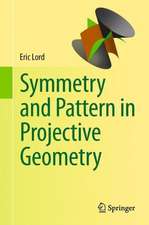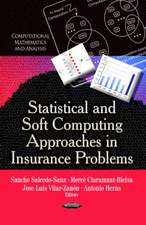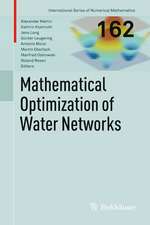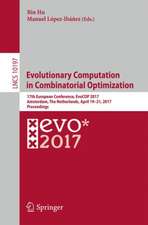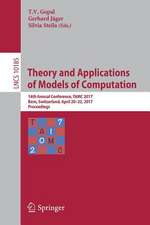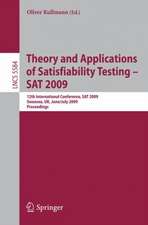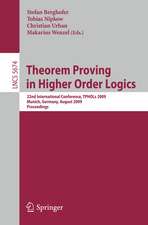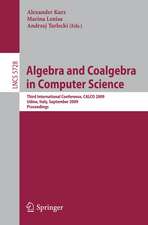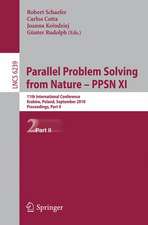Evolutionary Multi-Criterion Optimization: 9th International Conference, EMO 2017, Münster, Germany, March 19-22, 2017, Proceedings: Lecture Notes in Computer Science, cartea 10173
Editat de Heike Trautmann, Günter Rudolph, Kathrin Klamroth, Oliver Schütze, Margaret Wiecek, Yaochu Jin, Christian Grimmeen Limba Engleză Paperback – 19 feb 2017
Din seria Lecture Notes in Computer Science
- 20%
 Preț: 1061.55 lei
Preț: 1061.55 lei - 20%
 Preț: 307.71 lei
Preț: 307.71 lei - 20%
 Preț: 438.69 lei
Preț: 438.69 lei - 20%
 Preț: 645.28 lei
Preț: 645.28 lei -
 Preț: 410.88 lei
Preț: 410.88 lei - 15%
 Preț: 580.46 lei
Preț: 580.46 lei - 17%
 Preț: 427.22 lei
Preț: 427.22 lei - 20%
 Preț: 596.46 lei
Preț: 596.46 lei -
 Preț: 381.21 lei
Preț: 381.21 lei - 20%
 Preț: 353.50 lei
Preț: 353.50 lei - 20%
 Preț: 1414.79 lei
Preț: 1414.79 lei - 20%
 Preț: 309.90 lei
Preț: 309.90 lei - 20%
 Preț: 583.40 lei
Preț: 583.40 lei - 20%
 Preț: 1075.26 lei
Preț: 1075.26 lei - 20%
 Preț: 310.26 lei
Preț: 310.26 lei - 20%
 Preț: 655.02 lei
Preț: 655.02 lei - 20%
 Preț: 580.93 lei
Preț: 580.93 lei - 20%
 Preț: 340.32 lei
Preț: 340.32 lei - 15%
 Preț: 438.59 lei
Preț: 438.59 lei - 20%
 Preț: 591.51 lei
Preț: 591.51 lei - 20%
 Preț: 649.49 lei
Preț: 649.49 lei - 20%
 Preț: 337.00 lei
Preț: 337.00 lei -
 Preț: 449.57 lei
Preț: 449.57 lei - 20%
 Preț: 607.39 lei
Preț: 607.39 lei - 20%
 Preț: 1024.44 lei
Preț: 1024.44 lei - 20%
 Preț: 579.30 lei
Preț: 579.30 lei - 20%
 Preț: 763.23 lei
Preț: 763.23 lei - 20%
 Preț: 453.32 lei
Preț: 453.32 lei - 20%
 Preț: 575.48 lei
Preț: 575.48 lei - 20%
 Preț: 585.88 lei
Preț: 585.88 lei - 20%
 Preț: 825.93 lei
Preț: 825.93 lei - 20%
 Preț: 763.23 lei
Preț: 763.23 lei - 17%
 Preț: 360.19 lei
Preț: 360.19 lei - 20%
 Preț: 1183.14 lei
Preț: 1183.14 lei - 20%
 Preț: 340.32 lei
Preț: 340.32 lei - 20%
 Preț: 504.57 lei
Preț: 504.57 lei - 20%
 Preț: 369.12 lei
Preț: 369.12 lei - 20%
 Preț: 583.40 lei
Preț: 583.40 lei - 20%
 Preț: 343.62 lei
Preț: 343.62 lei - 20%
 Preț: 350.21 lei
Preț: 350.21 lei - 20%
 Preț: 764.89 lei
Preț: 764.89 lei - 20%
 Preț: 583.40 lei
Preț: 583.40 lei -
 Preț: 389.48 lei
Preț: 389.48 lei - 20%
 Preț: 341.95 lei
Preț: 341.95 lei - 20%
 Preț: 238.01 lei
Preț: 238.01 lei - 20%
 Preț: 538.29 lei
Preț: 538.29 lei
Preț: 412.41 lei
Nou
Puncte Express: 619
Preț estimativ în valută:
78.92€ • 82.60$ • 65.68£
78.92€ • 82.60$ • 65.68£
Carte tipărită la comandă
Livrare economică 31 martie-14 aprilie
Preluare comenzi: 021 569.72.76
Specificații
ISBN-13: 9783319541563
ISBN-10: 3319541560
Pagini: 684
Ilustrații: XIV, 702 p. 267 illus.
Dimensiuni: 155 x 235 x 37 mm
Greutate: 0.99 kg
Ediția:1st ed. 2017
Editura: Springer International Publishing
Colecția Springer
Seriile Lecture Notes in Computer Science, Theoretical Computer Science and General Issues
Locul publicării:Cham, Switzerland
ISBN-10: 3319541560
Pagini: 684
Ilustrații: XIV, 702 p. 267 illus.
Dimensiuni: 155 x 235 x 37 mm
Greutate: 0.99 kg
Ediția:1st ed. 2017
Editura: Springer International Publishing
Colecția Springer
Seriile Lecture Notes in Computer Science, Theoretical Computer Science and General Issues
Locul publicării:Cham, Switzerland
Cuprins
On the effect of scalarising norm choice in a ParEGO implementation.- Multi-objective big data optimization with Metal and Spark.- An empirical assessment of the properties of inverted generational distance indicators on multi- and many-objective optimization.- Solving the Bi-objective traveling thief problem with multi-objective evolutionary algorithms.- Automatically Configuring multi-objective local search using multi-objective optimization.- The multi-objective shortest path problem is NP-hard, or is it.- Angle-based preference models in multi-objective optimization.- Quantitative performance assessment of multi-objective optimizers: The average runtime attainment function.- A multi-objective strategy to allocate roadside units in a vehicular network with guaranteed levels of service.- An approach for the local exploration of discrete many objective optimization problems.- A note on the detection of outliers in a binary outranking relation.- Classifying meta-modeling methodologiesfor evolutionary multi-objective optimization: First results.- Weighted stress function method for multi-objective evolutionary algorithm based on decomposition.- Timing the decision support for real-world many-objective problems.- On the influence of altering the action set on PROMETHEE II's relative ranks.- Peek { Shape { Grab: a methodology in three stages for approximating the non-dominated points of multi-objective discrete combinatorial optimization problems with a multi-objective meta-heuristic.- A new reduced-length genetic representation for evolutionary multi-objective clustering.- A fast incremental BSP tree archive for non-dominated points.- Adaptive operator selection for many-objective optimization with NSGA-III.- On using decision maker preferences with ParEGO.- First investigations on noisy model-based multi-objective optimization.- Fusion of many-objective non-dominated solutions using reference points.- An expedition to multi-modal multi-objective optimization landscapes.- Neutral neighbors in Bi-objective optimization: Distribution of the most promising for permutation problems.- Multi-objective adaptation of a parameterized GVGAI agent towards several games.- Towards standardized and seamless integration of expert knowledge into multi-objective evolutionary optimization algorithms.- Empirical investigations of reference point based methods when facing a massively large number of objectives: First results.- Building and using an ontology of preference-based multi-objective evolutionary algorithms.- A fitness landscape analysis of pareto local search on Bi-objective permutation flow-shop scheduling problems.- Dimensionality reduction approach for many-objective vehicle routing problem with demand responsive transport.- Heterogeneous evolutionary swarms with partial redundancy solving multi-objective tasks.- Multiple meta-models for robustness estimation in multi-objective robust optimization.- Predator-Prey techniques for solving multi-objective scheduling problems for unrelated parallel machines.- An overview of weighted and unconstrained scalarizing functions.- Multi-objective representation setups for deformation-based design optimization.- Design perspectives of an evolutionary process for multi-objective molecular optimization.- Towards a better balance of diversity and convergence in NSGA-III: First results.- A comparative study of fast adaptive preference-guided evolutionary multi-objective optimization.- A population-based algorithm for learning a majority rule sorting model with coalitional veto.- Injection of extreme points in evolutionary multio-objective optimization algorithms.- The impact of population size, number of children, and number of reference points on the performance of NSGA-III.- Multi-objective optimization for liner shipping fleet repositioning.- Surrogate-assisted partial order-based evolutionary optimization.- Hyper-volume indicator gradient ascent multi-objective optimization.- Toward step-size adaptation in evolutionary multi-objective optimization.- Computing 3-D expected hyper-volume improvement and related integrals in asymptotically optimal time.





